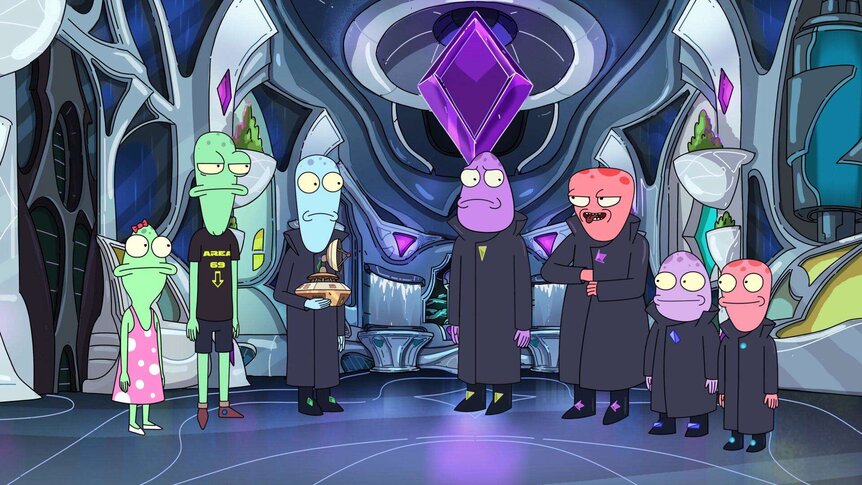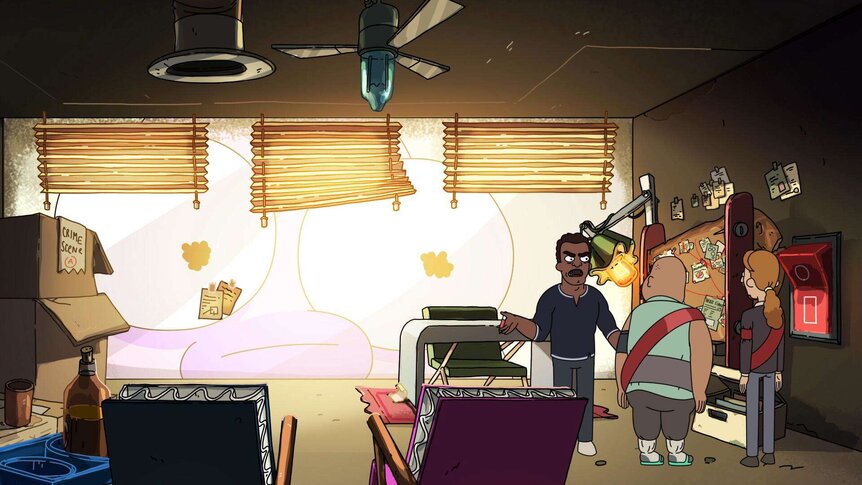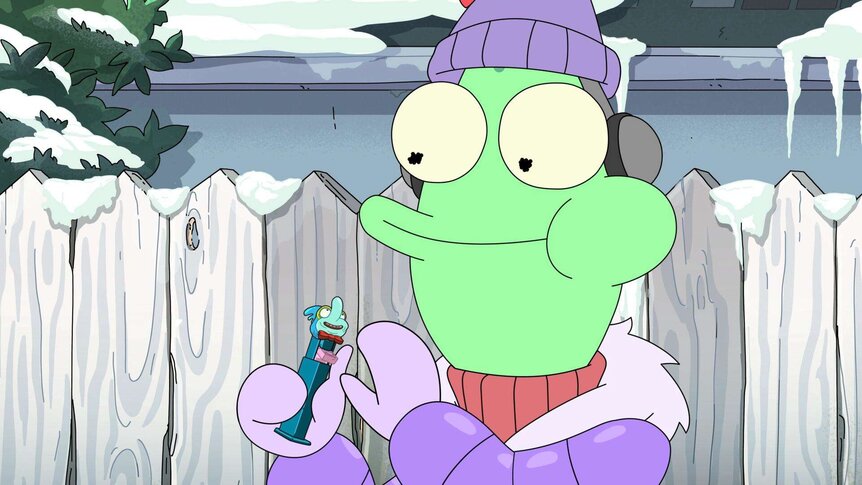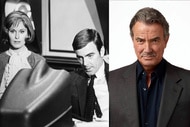Create a free profile to get unlimited access to exclusive videos, sweepstakes, and more!
Solar Opposites creators break down Season 2's Wall arc and a mask joke that had nothing to do with COVID
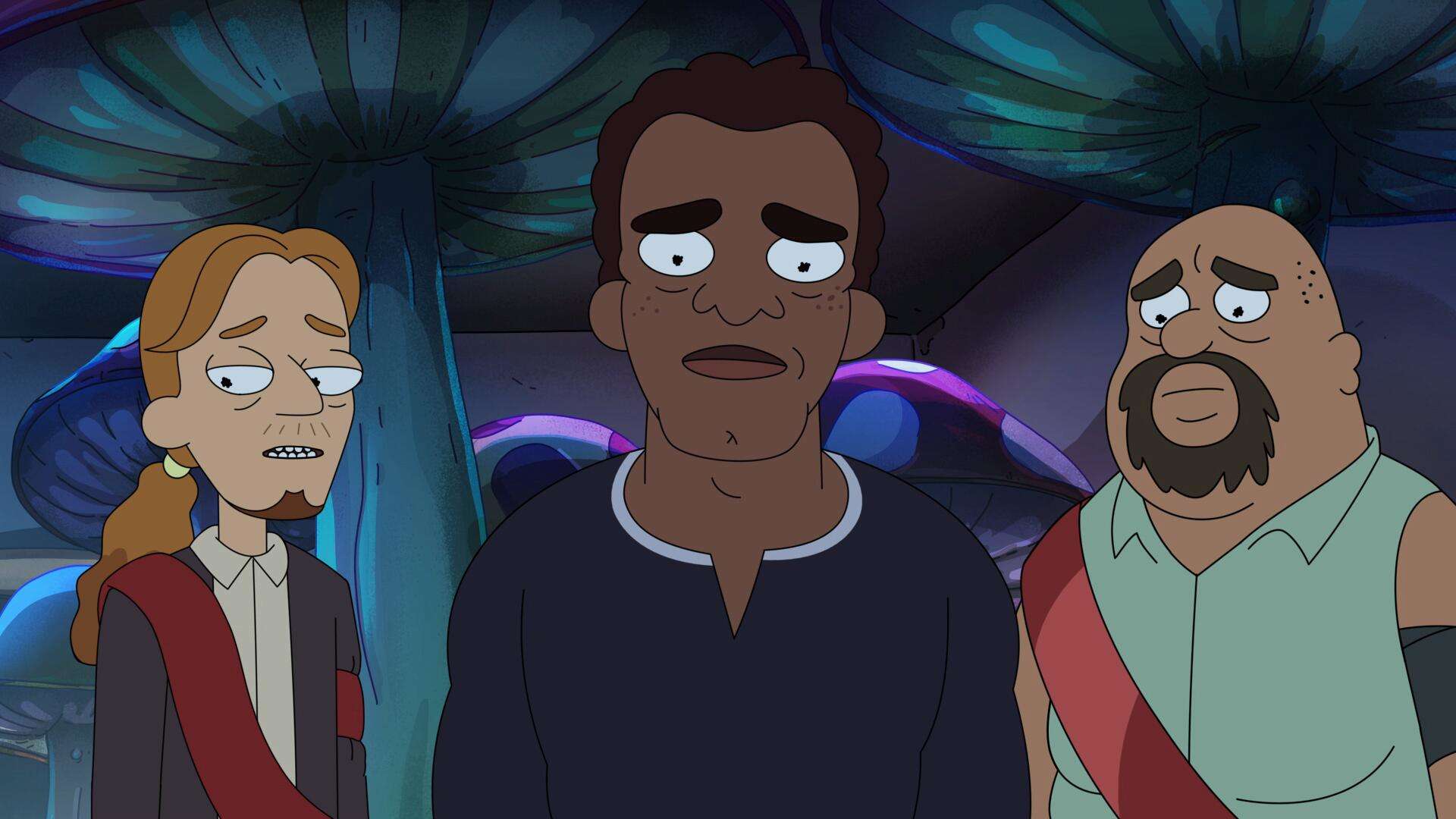
Great Pupas of fire! Less than a year after it first arrived on Earth (and by "Earth," we mean Hulu), Solar Opposites is back for its second season. Earlier this week, we provided you with a tantalizing teaser for the latest batch of eight episodes, but didn't go into great detail. Now, co-creators Mike McMahan and Justin Roiland (known for their work on Adult Swim's Rick and Morty) can fully discuss the hilarious insanity that is Season 2.
**SPOILER WARNING: The following contains major plot spoilers for all of Solar Opposites Season 2.**
The season premiere kicks off with a classic sitcom reset. Korvo (Roiland), Terry (Thomas Middleditch), Jesse (Mary Mack), Yumyulack (Sean Giambrone), and the Pupa are about to escape Earth on their repaired spaceship, but there's too much extra weight and they remain stranded. Since they're stuck here, the story takes another classic sitcom turn as the Solars go on an international trip and meet another group of Shlorpians secretly living beneath the streets of London.
But these new Shlorpians aren't anything like the aliens we know and love. They're super serious about their mission and are deathly afraid of humans discovering their true identities. "Are you crazy? Where are your masks?!" inquires a hysterical Zelvod (Fred Tatasciore) when Korvo, Terry, and Jesse first enter the subterranean ship. The U.K.-dwelling extraterrestrials hide their faces with cheesy, Halloween-style masks and while this may seem like a topical gag meant to reflect the coronavirus pandemic, it was just a happy accident.
"I don’t even know if it’s a happy accident. I guess just a regular ass accident," McMahan (also the mind behind Star Trek: Lower Decks) tells SYFY WIRE.
"[Animation] takes so f***in' long. At that point, we weren’t even in a pandemic, were we?" Roiland adds.
"No, we had launched," McMahan answers. "That episode was being animated and we were like, ‘We’re going to South by Southwest!’ And then we’re like, ‘No, we’re not.’"
In actuality, the joke stemmed from the creators' desire to move away from classic aliens-on-Earth tropes, which is something they talked about when SYFY WIRE caught up with them ahead of the show's premiere last spring. The main characters aren't trying to hide from the government and the government isn't all that interested in capturing them. It immediately creates a fresh premise while opening the creative floodgates for all sorts of sci-fi scenarios that don't revolve around the expected genre platitudes.
"It’s just funny that the Shlorpians we follow are just living amongst the humans and it’s not a big deal," Roiland adds. "And then these guys are like almost a representation of what the show might’ve been in other hands. But I just love those Ninja Turtle-style [masks]. Donatello in disguise is this big, floppy human turtle."
"I love how dorky they are," McMahan says. "They call people ‘Terrans’ and they eat garbage. It’s just so embarrassing when you meet them ... Those aliens, to me… it’s not a commentary about the pandemic. It’s a commentary on how bad our show would be if we cared that anybody knew our guys were aliens or if they had to Alf it up all the time. That’s just not what our show is and I think that’s what that was."
Season 2 also builds out the story of "the Wall," a miniature society of tiny humans stuck within the ant farm tunnels etched into Yumyulack and Jesse's bedroom. With the Duke (Alfred Molina) no longer in power, the petite civilization is thriving under the leadership of revolutionary leader Tim (Andy Daly). As McMahan has said before, the production really wanted to play around with different genres when it came to this peripheral narrative.
For most of the second season, the Wall arc follows Halk (Sterling K. Brown), a haunted war hero trying to solve a string of grisly murders in peacetime. Whereas Season 1 drew on Mad Max, Game of Thrones, Escape from New York, and the historical event known as the War of the Roses, Season 2 was mainly inspired by gritty and nihilistic crime dramas such as True Detective and David Fincher's Seven.
"Sterling K. Brown brought so much to the Wall and his portrayal of this Halk," McMahan says. "When I talk to Justin about, 'What do we think [the] second season of the Wall should be?' it was like, ‘We don’t want to lose all the fun stuff we had. We just wanna tell more stories and build it out.’ First season was the rise of this rebellion, second season it’s like you start off and everything seems OK, but it’s got a dark underbelly."
"Dude, just doing a serial killer thing is the f***ing best idea ever," Roiland continues. "Like, what the f***? Just everything about it in a tiny [universe] — all the jokes we get to do about all the little tiny things. With the crazy chase sequence over the f***in' fortune cookie. It’s just so f***in' funny. It’s like all of the weight that you would expect from an actual murder mystery/action-packed Richard Ramirez chase sequence, but they’re sliding through a f***in' fortune cookie. It’s like so good. That’s what the Wall is at its best. Those things coming together."
McMahan knows a pitch "is really working for an episode" when his co-showrunner, Josh Bycel, says something to the effect of, "'Did I see this plot on Modern Family?’ When we’re laughing that no other show could do this plot, that’s when we’re in the zone."
The key to the Wall's humor is playing things completely straight, even when the situations seem far-fetched to us regular-sized viewers. Halk's PTSD, for example, is the result of him pulling bodies out of an avalanche of Nerd candies.
"It’s funny because it’s absurd, but it’s important to them," McMahan explains. "Like the scene where [Tim] kills people with Magic Shell [the quick-hardening ice cream syrup]. That’s f***in' stupid, but it’s awesome. It’s important to them, but it’s Magic Shell in a bong. When you really parse it open, it’s like, ‘Oh yeah, that’s silly,’ but to them, it’s important. Justin and I have said this before that the Wall is us cosplaying as drama writers. We’re getting to feel like [that] for a little bit: 'What does it get to feel like to be a drama writer?' And the second it gets hard, we’re like, ‘Anyway…now the Solar Opposites are stuck in a grocery store!’ We get to pull the ripcord, it’s really funny."
By the end of the season, the parallel storyline returns its focus to Tim's betrayal of Cherie (Christina Hendricks), who returns to the Wall with her newborn child, Pezley (she was born inside of a Pez dispenser after all). Now a martyr to the Wall's citizens, Cherie reunites with Halk and plans to tear down Tim's facade of normalcy.
"We mapped out three or four seasons of the Wall... The Cherie episode really feels like we’re back to business," McMahan explains. "It felt almost like we paused and then got back to it. And then you see that in Season 3, the mix of Tim, Halk, and Cherie. That’s the true evolution of where the Wall story goes. We had a blast pulling from all these tropes and all this fun stuff. But the crown jewel — and I don’t think anybody will be surprised — is that seventh episode, where [we spend the entire runtime with the Wall characters). That’s the real kicker, that’s the real fun."
RIP Ringo.
Last season, McMahan admitted that Korvo's little monologues at the start of each episode's opening titles were modeled after The Simpsons running tradition of couch gags. In Season 2, Solar Opposites once again shows its debt of gratitude to Matt Groening's long-running sitcom with a slew of self-aware and good natured jokes at Hulu's expense.
"Hulu’s awesome," Roiland says. "They sort of see them when the scripts go in."
"They could take them out if they ever wanted," McMahan reveals. "In fact, I think they’ve only ever taken one out and I don’t even remember what it was, but it was clearly bait to see if they would take it out. But all those Hulu jokes — it’s partially Bart Simpson making fun of Fox. We just loved that and ... then a part of it is like when you make fun of your best friend in a way. You’re the best at tearing down your best friend because you know them [so well]. We love Hulu because we get to make Solar Opposites, so that’s the game we’re playing with them. Hopefully, we didn’t do it too much."
Season 2 of Solar Opposites is now streaming on Hulu.
